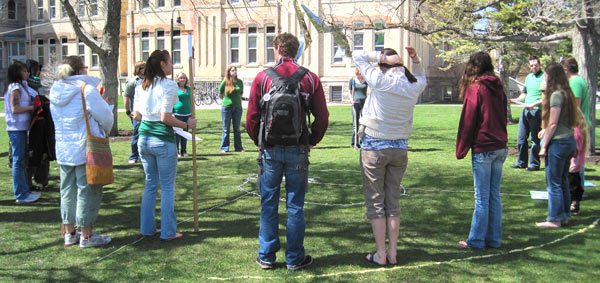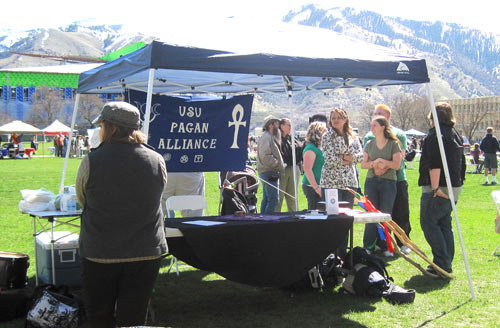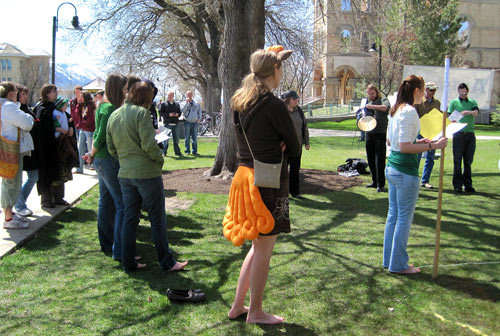Pagans worship Mother Earth as part of Earth Day at USU
April 23rd, 2011 Posted in Arts and LifeStory & Photos by Heidi Hansen
LOGAN—The USU Pagan Alliance stole the scene during A-Day with the performance of a public ritual to celebrate Earth Day around noon on Friday.
Of the 25 participants, most were members of the Pagan Alliance, an informal organization of students and others, but the strange songs and chants they uttered caught the attention of fellow students enjoying the A-day festivities on the Quad.
 For the ritual, students stood on the west side of the Quad in a circle with a cross in the middle to indicate compass directions, and read a script focused on worshiping Mother Earth.
For the ritual, students stood on the west side of the Quad in a circle with a cross in the middle to indicate compass directions, and read a script focused on worshiping Mother Earth.
“The ritual got a lot of attention,” said club member Will Holloway, a philosophy major. He added that those who stopped to observe or ask questions seemed genuinely curious.
“We fulfilled our purpose to synchronize with the Earth,” said Pagan Club President Kassie Cressall, an ordained minister through the Universal Life Church. “We wanted to get out here and be accessible to people… I’m happy people stopped and paid attention.”
Jason Porter, who returned to campus after a 15-year break from school, fielded questions at the Pagan Alliance table all day. Passersby may have been surprised to see a ritual meant to help pagans connect with and honor the Earth, instead of seeing animal sacrifices or virgin offerings, as myths about modern pagan religious practices often purport.
“We wanted to make it not scary and accessible to people of different religions,” said Cressall, a veterinary science major.
She created the Pagan Alliance at USU last fall after moving to Logan from Colorado. “It was kind of selfish really,” she said. “I missed the sense of community, wanted a place to ask questions.”
 Paganism is a broad term that encompasses most non-Abrahamic religious systems. Pagans are generally polytheist, may call themselves witches, and are often focused on connecting with the Earth.
Paganism is a broad term that encompasses most non-Abrahamic religious systems. Pagans are generally polytheist, may call themselves witches, and are often focused on connecting with the Earth.
The most well-known form of Paganism was practiced in ancient Greece and Rome, worshiping gods like Zeus and Thor. However, today Wicca has become a very popular tradition.
“Paganism is one of the fastest growing religions in the country,” said Sevya Edmiston, 41, a self-described heathen who ran a Pagan group on campus in the 1990s and early 2000s. “It’s good to see people practicing the old faith.”
Edmiston attended the ritual with his wife Kira and 11-month-old daughter, Satara. They are part of the Cache Valley Kindred, which practices the Asatru (Norse) tradition.
The USU Pagan Alliance, whose motto is “Honoring nature, seeking knowledge and living truth—the ancient way,” seeks to provide students who are interested in Earth-centered, esoteric/occult, Pagan or mystical spirituality with a friendly and accepting community.
“Every human being is different,” Cressal said, discussing why club members are not required to proscribe to any specific dogma, “they come to truth in their own form.” Pagan Alliance members adhere to many different traditions, including Celtic, Wiccan and Heathen.
Kate Black, 22, an American Studies major, believes most women are witches, though they may not be conscious of it. She said her favorite thing about Paganism is that “you don’t have to have a label.” She added that joining the Pagan Alliance has been a very friendly and welcoming experience.
Many members of the USU Pagan Alliance grew up in the LDS church, but say they had more meaningful experiences with nature, which led many to practice the ancient world’s Pagan religions in a modern way.
 Destiny Cook, club secretary and a dental assistant student at Bridgerland Applied Technology College, started exploring Paganism after she turned 18 and experienced some hard times. She grew up LDS, but said she saw that “church didn’t speak the way the Earth did” to her, and she found consolation to her frustrations only after venting in the forest.
Destiny Cook, club secretary and a dental assistant student at Bridgerland Applied Technology College, started exploring Paganism after she turned 18 and experienced some hard times. She grew up LDS, but said she saw that “church didn’t speak the way the Earth did” to her, and she found consolation to her frustrations only after venting in the forest.
“My parents see that there’s a level of happiness there for me,” Cook said, explaining how her family took the news that she was Pagan now, but they don’t like to ask questions about it.
Cressall was also raised LDS but turned to Paganism as a young adult. She belonged to a Celtic Reconstructionist group in Colorado before she came to USU.
Cressall says her favorite compliment is for a new acquaintance to say she doesn’t look like she’s not Mormon. For her, the Pagan religion can be an organic experience specific to the individual.
“It’s having awareness,” Cressall said. “You learn the heartbeat of nature and synch yourself up to that.”
TP
Tags: Earth Day, Mother Earth, Pagan Alliance

Sorry, comments for this entry are closed at this time.